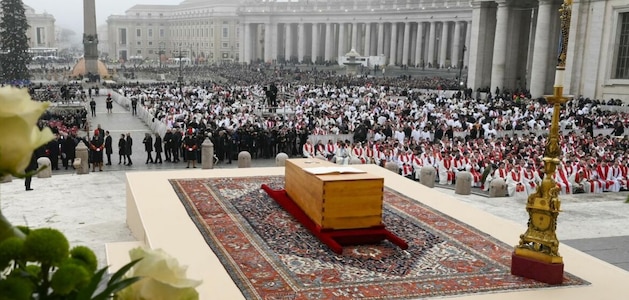DOMRADIO.DE: How was the service for the late Joseph Ratzinger?
Ingo Brüggenjürgen (DOMRADIO.DE Editor-in-Chief): That was all dignified and right, to stay in the language of the liturgy. It was a plain and simple service, just like Benedict XVI. had wished for. Over 100 cardinals and 400 other bishops were present. Around 4,000 priests celebrated with them and numerous religious were there.
Today many parts of the world came together in Rome and a colorful picture emerged. However, the large St. Peter’s Square was only half full. The number of 60,000 people that was mentioned in advance seems to me to be far too high.
There were numerous high-ranking politicians there. From Germany, all the heads of the five constitutional bodies were represented, i.e. Federal President Frank-Walter Steinmeier, Federal Chancellor Olaf Scholz, the Presidents of the Bundesrat, Bundestag and Federal Constitutional Court.
The Bavarian faction was also impressive, led by Prime Minister Markus Söder to the mountain riflemen. So everything that simply belongs to Benedikt was there: homeland, politics and mountain riflemen.
DOMRADIO.DE: What did Pope Francis preach about? Was there a specific message for the believers?
Brüggenjürgen: I found the final sentence to be crucial. Francis says almost affectionately, “Benedetto, faithful friend of the Bridegroom Jesus Christ, may you now experience the full and well-deserved joy of hearing the voice of Jesus Christ definitively and forever.”
With this, Francis once again expressed the great Christian hope that in the end we will all have a dwelling place with God that is set up for us.
The Pope’s sermon was a simple sermon. It wasn’t very nested. He used the words of Jesus and said: “Father, into your hands I commit my spirit”. That is the basic trust in which Ratzinger has always lived. Francis once again urged the faithful to have this trust.
DOMRADIO.DE: How does the death of Benedict change the pontificate of Francis?
Brüggenjürgen: Something will change. I think so, even if it only happens subconsciously. Francis has so far followed his own path and set his own accents. For example with the world synod, to which he sent the church with his great commitment to climate protection with his encyclical “Laudato si” or by repeatedly turning to the fringes, to the poor, to the refugees.
Francis consistently went his own way during Benedict’s lifetime. But it will be something different when his predecessor no longer lives a few meters next door to the garden.
I think that Francis can now play a little more freely, discover new perspectives for himself and also want to actively pursue these paths. I haven’t felt any tiredness here in the past few days.
DOMRADIO.DE: What remains of Pope Benedict XVI. in remembrance?
Brüggenjürgen: What will definitely remain are the many personal encounters that people had with Joseph Ratzinger over the course of his long life. They will be remembered and shaped. In these moments he was able to convince as a person.
Benedict had two facets. First, a servant. This became clear, for example, during his papal election in 2005, when he stepped onto the loggia of St. Peter’s Basilica and said: “I am just a humble worker in the Lord’s vineyard”.
He put his light under a bushel because he was a professor and a great theologian who helped shape Vatican II.
But the second facet was always more decisive for me. Even as Pope Benedict, he was still able to kneel in front of the Blessed Mother with a simple candle and immerse himself in prayer, just like during his visit to Altötting. Joseph Ratzinger did a good job of bringing these two major facets together.
Church history will certainly remember his resignation, which opened up a whole new perspective for the church. A resignation of your own free will, sovereign and responsible to your own conscience. He made it clear that office and person can very well be separated and that resignations are also possible in the Catholic Church.
The interview was conducted by Florian Helbig.
The original of this post “”The final sentence was decisive” in the sermon for the late Benedict” comes from DOMRADIO.DE.








